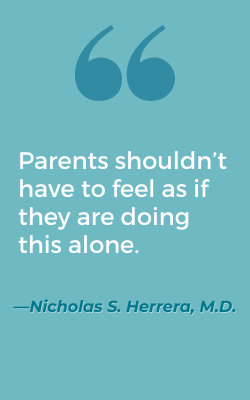
Published on December 7, 2021 | Since Kari Lusby’s son, Honor, was diagnosed with PKD at age 4, she and her family have managed his disease by focusing on the main tenets of good health. Nutrition, hydration, movement, sleep, mindset, and mental toughness. As Honor enters his teenage years and becomes more independent, Lusby worries he’ll sometimes forget to make the best choices for his long-term health. There are several ways to help your teens manage PKD.
Helping a child transition to adulthood is always difficult for parents, but it’s even more challenging when the child has PKD, says Nicholas S. Herrera, M.D. Dr. Herrera is an assistant professor of internal medicine and pediatric transplant nephrology with the University of Kansas Health System and Children’s Mercy Hospital. He provides kidney care to adults and children with a focus on transplant care and transition of care. In guiding children toward independence, Dr. Herrera suggests identifying areas that should be managed critically versus passively and following the idea of “trust but verify.”
Start Gradually
For instance, daily medication will probably be essential for many teens, while a perfect diet or frequent blood pressure checks may be less crucial. For critical items, Dr. Herrera recommends gradually increasing kids’ responsibilities, then consistently checking in. Around once or twice weekly for a 13-year-old or every other week for a 17-year-old. Learning to manage PKD can take time.
 If they miss medication doses, be upfront about the long-term importance for their health. Teens may see the “benefits of their own choices” when a treatment or diet reduces symptoms like headaches, Dr. Herrera adds. “That improves their maturity, [and] that improves their adherence.”
If they miss medication doses, be upfront about the long-term importance for their health. Teens may see the “benefits of their own choices” when a treatment or diet reduces symptoms like headaches, Dr. Herrera adds. “That improves their maturity, [and] that improves their adherence.”
You can also steadily assess and expand your teens’ self-management. That could mean memorizing emergency contacts or medications, planning healthy meals, monitor their own refills, or scheduling follow-up appointments to get necessary bloodwork.
“There are multiple little assessments like this that any parent can ask their child to see if they’re ready for that transition,” Dr. Herrera explains. Additionally, many pediatric nephrologists have a transition program for teens that typically includes disease knowledge, medications, routine young adult healthcare, self-management skills, and overall confidence.
“Parents shouldn’t have to feel as if they are doing this alone,” Dr. Herrera says.
Stay Positive
In learning to manage PKD, positivity is important. During this process, Dr. Herrera emphasizes maintaining trust with your teen. “You don’t want to damage that family relationship—at the expense of ‘perfect control’ of a patient’s disease process,” he says. “We’re trained to deliver bad news and introduce changes to care. It’s okay to let us be the ‘bad guy’ if needed. Remember, it’s not a sprint, it’s a marathon.” Focus on understanding your teen’s needs and striking a balance.
“It takes one baby step at a time and one small piece of trust, allowing for maturity, autonomy, and development in your child.”
Honor is now 12, and Lusby is already planning ahead. “We kind of have a short period of time before they go out into the world to teach them good habits that will keep them healthier longer,” she says. “I do think it will be hard to step back as he gets older. I’m hoping that we’re doing a good enough job that he’ll make good decisions most of the time.”
Want to see more articles like this? Read the full issue of our magazine, PKD Life, and subscribe to future issues here.









0 Comments